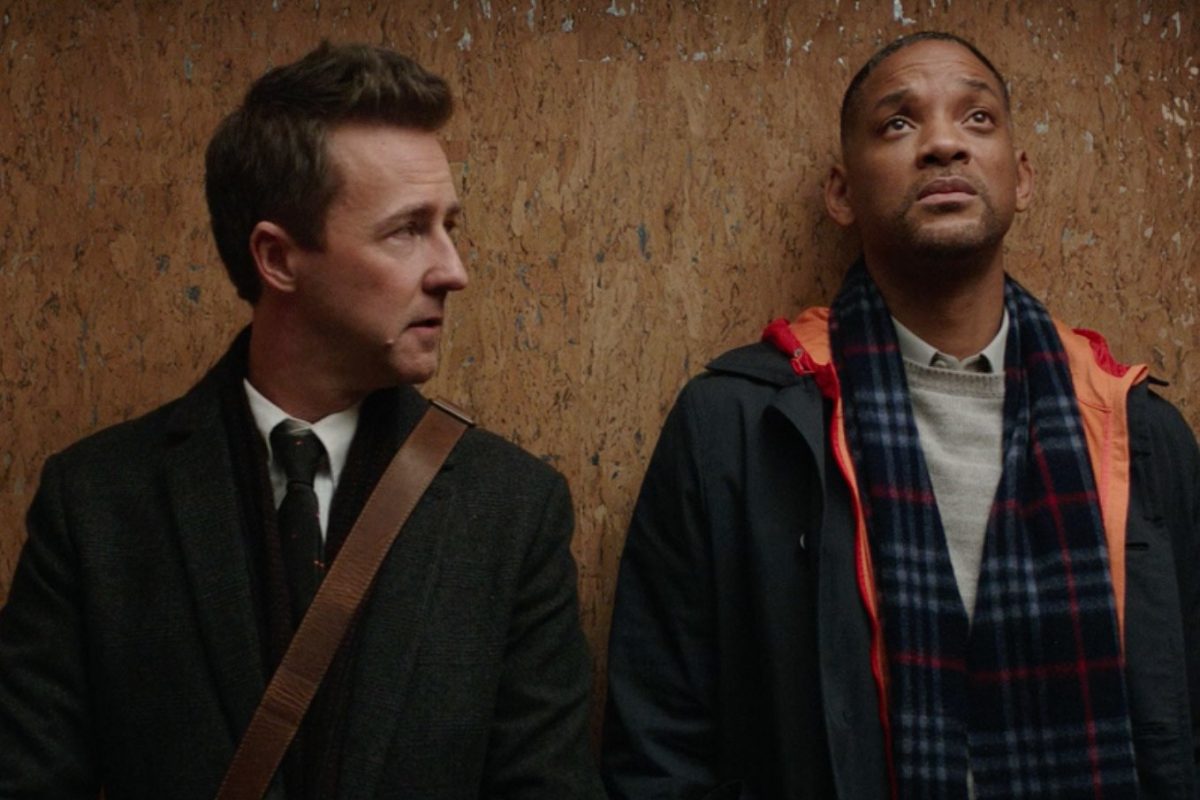 (2 / 5)
(2 / 5)
Collateral Beauty is a awards-baiting drama about three big-city advertising execs who come together to gas-light their grieving friend for the sake of a big payday.
Okay, so it’s not quite as a simple as that, morality-wise; a fact that the film is desperate to impress upon us.
Former ad guru Howard (Will Smith) is a gaunt, unshaven wreck after the death of his young daughter. He spends his nights not sleeping, sitting alone in the dark, or else furiously pedaling his bike into traffic. His days are spent at the office, building vast, color-coordinated conurbations out of dominoes. His friends-cum-partners Whit (Edward Norton), Claire (Kate Winslet), and Simon (Michael Pena) are concerned for him and for the future of the company.
Since they can’t get him to sign off on them selling it or, you know, do any work, Whit hires a private investigator to follow Howard and in doing so learns that the grieving man has been writing angry letters to Death, Time, and Love, the three concepts he once described as being crucial to all human interaction.
As such, Whit, Claire, and Simon decide to take the next logical step: rather than force their friend into receiving treatment for his clear suicidal tendencies — such as, you know, pedaling his bike into traffic — they hire three theater actors, Aimee (Keira Knightley), Raffi (Jacob Latimore), and Brigitte (Dame Helen Mirren) to confront Howard in the guise of these three concepts. For his own good, you know, to make him engage and stuff.
Also, so they can record the confrontations and digitally remove the other participants, thereby making Howard look certifiable to the board of directors and almost certainly committing some sort of fraud in the process; not to mention the huge ethical boundaries.
Allan Loeb’s screenplay does seem at least vaguely aware of this. In fact, he has one of the three actors, Aimee/Love (Kiera Knightley), challenge Howard’s three friends on the (correctly) perceived horribleness of their plan — the term “gas-lighting” even makes an airing. These concerns, however, are quickly brushed aside in favor of airy platitudes and quick-fix life lessons.
Collateral Beauty is the screenwriting equivalent of a Mechano set and the moral equivalent of stealing from an elderly relative: sure, you may be able to justify it to yourself, but the fact you’re having to debate it means you’ve already lost.
Each of Howard’s “friends” are neatly paired up with the actor best positioned to help them neatly deal with their personal issues.
For Whit, it’s Aimee, a potential romantic foil and supposed conscience of the group who’s ultimate purpose is basically to say, “It’s okay you cheated on your wife, you can still emotionally blackmail your insufferable public-school daughter into loving you.”
For Claire, it’s twenty-year-old Raffi, who gets to be all wise-beyond-his-years about the fact she’s apparently left it too late to have kids (Kate Winslet is 41. Forty-fucking-one).
For Simon, it’s the fact he’s literally fucking dying, but at least Helen Mirren gets to be sparky in offering solace.
Naomi Harris, meanwhile — shortly to be Oscar nominated for her performance in Moonlight — plays Madeleine, who runs a support group that Howard occasionally attends when his dramatic arc requires it.
Collateral Beauty is a film in which people offer each other advice like “Love is the meaning of everything” or “Nothing’s ever really dead when you look at it right” (to a dying man no less), mock receiving or are self-effacing about having given such advice, then ultimately concede what good advice is was.
Also, since they work in an advertising firm, it’s a chance for screenwriter Loeb to use his characters to congratulate himself on how good his copy-writing skills are (hint: not actually that good).
All the actors have such conviction, though — Smith especially captures Howard’s impotent grief and rage at the loss of a child — and the production values are high enough that, if you squint, you could almost mistake it for profound.
Director David Frankel has simultaneous airiness and sharpness, combined with Theodore Shapiro’s soul-searching piano score, belies the fact that this is essentially one of those insufferable Garry Marshall holiday movies (Valentine’s Day, New Year’s Eve), though its few of New York is closer to Sex And The City; defined solely by upmarket apartments and people riding the subway.
Collateral Beauty, in yet another act of egregious box-ticking, is also a Christmas film, in so far as there’s a scene where Edward Norton and Kate Winslet have a talk on a bench in the middle of a Christmas tree sale and there’s a sort of joke about Norton’s character possibly not celebrating Christmas at home (’cause he’s Jewish?).
This is a film that unironically contains the line “When something starts with a six year-old dying, nothing is gonna feel right” and, coming from the director of both The Devil Wears Prada and Marley & Me, its dramatic sensibilities fall uncomfortably between the two.
Thanks to a talented crew and some committed performances, Collateral Beauty even manages to land a few of its emotional scenes, but it doesn’t take away from the fact that this is all in service of a film that was fundamentally flawed from its moment of inception.
